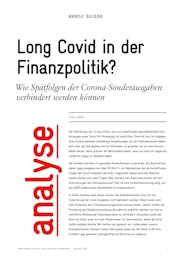“Long covid” describes the long-term consequences of coronavirus disease. There is controversy around the question of how widespread the problem is. What is fairly clear, though, is that Covid-19 will have a protracted impact on government finances all over the world. The same thing applies here as to individuals: the healthier you were before being attacked by the virus, the less likely you are to struggle with negative effects in the long term.
Switzerland embarked on the crisis with healthy government finances. This meant the federal government was able to promptly okay spending of more than CHF 30 billion to tackle the economic effects of the Covid-19 pandemic. Given the enormous expenditure involved, two questions arise: How compatible is this intervention with the balanced budget requirements (the debt brake)? And is special financing necessary to offset the government deficit that’s opened up in 2020?
In this analysis, Avenir Suisse shows why the balanced budget requirements do not have to be eased to finance Covid-19-related spending. It can be made good without amending the Federal Financial Budget Act. Nevertheless, budget proposals should build in corrections to prevent the debt brake from having too restrictive an effect. In particular, the federal government should also refrain from imposing an extraordinary tax on corporations that didn’t suffer during the crisis. Overall we should resist the temptation to ease our fiscal discipline. It’s precisely this rigour that put the government in the comfortable position of being able respond decisively to the crisis.





